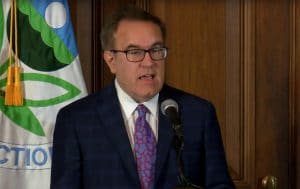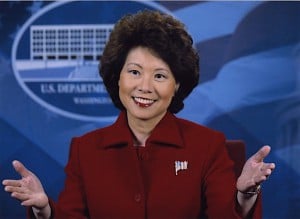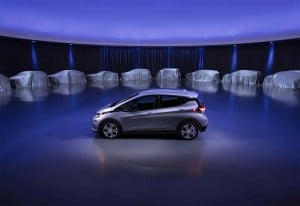
EPA Admin Andrew Wheeler, a former coal-industry lobbyist, announced plans to eliminate the California CO2 waiver last month.
(Correction: in the second-to-last paragraph, it is GM, not Ford, that has come in for sharp criticism by Sen. Tom Carper.)
General Motors, Fiat Chrysler and Toyota have stepped into the legal battle triggered by last month’s White House announcement that it would strip California of the right to set limits on automotive greenhouse gas emissions – a move that would effectively end that state’s ability to also set fuel economy standards stricter than those in place at the national level.
California and 22 other states, as well as environmental groups such as the Sierra Club and National Resources Defense Council, have sued the administration hoping to block the move – which analysts believe would also negatively impact plans to boost sales of battery-cars and other zero-emission vehicles.
The original Clean Air Act did give California the unique ability to set its own limits on traditional automotive pollutants, such as oxides of nitrogen and particulates. Under President Obama, that authority was expanded to include CO2 emissions, which meant it could also set unique fuel economy guidelines since the amount of carbon dioxide a vehicle produces is directly related to the amount of gasoline – or other carbon-based fuels – are burned.
(White House to eliminate CA CO2 waiver. Click Here for our initial coverage.)
The three automakers, as well as the National Automobile Dealers Association, echoed the position laid out by the Trump Administration last month, arguing ”that states cannot interfere with federal fuel economy standards.”

Transportation Secretary Elaine Chao is expected to announce a rollback of the federal Corporate Average Fuel Economy standards next month.
The impact of that move, if approved by the courts, would be substantial considering California is the largest single automotive market in the U.S. And other states have the ability to opt for the stricter California standards, something 16 have so far done, a collective group representing more than a third of all U.S. new vehicle buyers.
GM, FCA and Toyota are by no means the only automakers to oppose California’s ability to set its own fuel economy standards. Kia, Mazda, Nissan and Subaru also support the decision to strip California’s rule-making authority. But, until now, the industry has been sitting on the sidelines hoping to avoid getting caught in the spotlight where they could come under fire from environmental activists, as well as California regulators.
The decision to step into the legal battle puts the three automakers on the same side as Alabama, Ohio, Texas, Utah and West Virginia, which have all told the U.S. Court of Appeals for the District of Columbia that they support the administration’s action.
The issue has created a whirlwind of legal activity. The White House has also launched an anti-trust investigation of four automakers – Ford, BMW, Honda and Volkswagen – which negotiated a deal with the California Air Resources Board in July. That agreement would require them to meet mileage targets stricter than those currently set under the federal Corporate Average Fuel Economy, or CAFE, standards but lower than what California had originally mandated.
(Four Automakers Sidestep Trump, Make Fuel Economy Deal with CARB)

Despite promising to push development of all-electric vehicles, such as this Chevy Bolt EV, GM wants to eliminate the CA CO2 waiver and roll back CAFE.
When the White House announced its decision to strip California’s authority to regulate automotive CO2 levels, officials also said they would revise the CAFÉ targets set under the Obama Administration in 2012. That move has been delayed, with no specific timing yet announced.
The final revision is expected to call for an annual increase in mileage of 1.5% through 2026, fallen well short of the 54.5 mpg target originally set under the former president for 2025.
(Why has the White House again delayed CAFE rollback announcement?)
The decision by GM, FCA and Toyota to get involved in the legal battle drew a sharp rebuke from Tom Carper, the top Democrat on the Senate Environment and Public Works Committee. “Instead of choosing the responsible path forged by four automakers and the state of California, one that will move us toward the cleaner, alternative fuel vehicles of the future, Carper said in a statement, “these companies have chosen to head down a dead-end road.”
The anticipated rollback of CAFE also is expected to wind up triggering a court battle. As a result, a number of companies, including Honda, have said they don’t plan to change their own mileage strategies, at least not immediately. The industry also is waiting to see what might happen a year from now. The 2020 election could see power in Washington change hands and, were Democrats to take charge of the White House and Senate, they could again reverse course on fuel economy standards.

If I were Ford, Honda, BMW and Volkswagen, I would use this in my marketing. These four can be the ones who care about the environment, while GM, et al… are supporting Donald Trump. He is very unpopular here, as you might know, so this could be a good way for those 4 to sell more cars.
Please correct serious accusation of Ford in second to last paragraph.
It’s GM, not Ford.
Thanks.
Ouch, Karl, thanks for the catch. Will correct immediately.
Paul E.